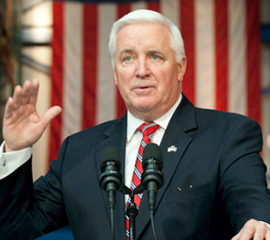Pennsylvania will not set up its own health care exchange under the federal Affordable Care Act, at least not for now, Gov. Tom Corbett said Wednesday, putting the state on a course to join others led by Republicans that will let President Barack Obama’s administration run its exchange.
Setting up a state-based exchange would be irresponsible, Corbett said, as he faulted federal authorities for what he called inadequate answers to his questions about cost and other issues.
“Health care reform is too important to be achieved through haphazard planning,” Corbett said. “Pennsylvania taxpayers and businesses deserve more. They deserve informed decision making and a strong plan that responsibly uses taxpayer dollars.”

The Corbett administration also is rejecting the option of running the exchange as a partnership with the federal government, spokeswoman Christine Cronkright said. But she also noted that the administration has the ability under the law to re-evaluate every year whether to get involved.
Corbett said it “would be irresponsible to put Pennsylvanians on the hook for an unknown amount of money to operate a system under rules that have not been fully written.”
Many Democratic lawmakers, insurers and hospitals wanted Corbett to set up a state-run system. As Pennsylvania’s attorney general in 2010, Corbett joined a federal lawsuit with officials from other states challenging the constitutionality of the landmark federal health care law that was ultimately upheld by the U.S. Supreme Court.
The state Republican Party thanked Corbett for rejecting the exchange. The Washington, D.C.-based group Americans for Prosperity, which was founded by billionaire energy executives Charles and David Koch, had urged Corbett along with other governors to reject it. The group even sent a news release 20 minutes before he released his decision publicly Wednesday, saying they expected Corbett to “bring Christmas early to Pennsylvania” by rejecting an exchange.
State Sen. Daylin Leach, D-Montgomery, said Corbett’s reasons for not participating appeared to be more thoughtful than some Republican governors who refused to participate strictly on partisan or ideological grounds. A better test of Corbett’s interest in helping the uninsured will come when he decides whether to pursue a federally funded expansion of Medicaid under the law, Leach said.
Antoinette Kraus, of the Philadelphia-based health care advocacy coalition Pennsylvania Health Access Network, said the Corbett administration could have taken advantage of the opportunity to be innovative in crafting the health care exchange specific to Pennsylvania. But, she said, the most important thing is that people will get help finding coverage through the exchange.
“It’s doesn’t matter if it’s the state or the federal government running it at the end of the day,” Kraus said.
So far, 17 states and Washington, D.C., have said they will set up their own exchanges, while 20 other Republican-led states have opted to allow the federal government in. Another seven states have picked the partnership model, and the rest are trying to decide. States that want to run their own exchanges had until Friday to submit plans, and the deadline for partnership applications isn’t until February.
The new insurance exchanges will allow households and small businesses to buy a private health plan, and many will get help from the government to pay their premiums. Under the law, states that can’t or won’t set up exchanges will have theirs run by the federal government.
The partnership option allows states to handle consumer relations and oversight of health plans, while the federal government does the bulk of the work, including handling enrollment and figuring out how much taxpayer-funded help consumers may be entitled to.
Topics Pennsylvania
Was this article valuable?
Here are more articles you may enjoy.


 AIG Underwriting Income Up 48% in Q4 on North America Commercial
AIG Underwriting Income Up 48% in Q4 on North America Commercial  Portugal Deadly Floods Force Evacuations, Collapse Main Highway
Portugal Deadly Floods Force Evacuations, Collapse Main Highway  Q4 Global Commercial Insurance Rates Drop 4%, in 6th Quarterly Decline: Marsh
Q4 Global Commercial Insurance Rates Drop 4%, in 6th Quarterly Decline: Marsh  Florida Insurance Costs 14.5% Lower Than Without Reforms, Report Finds
Florida Insurance Costs 14.5% Lower Than Without Reforms, Report Finds 

